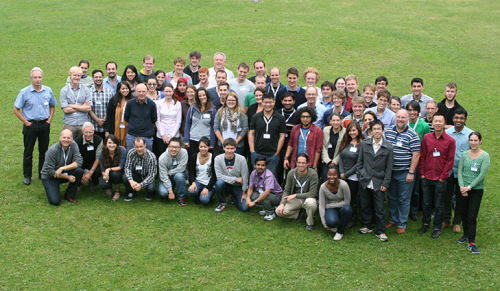The International Summer School Quantsol will inform on basics in photovoltaics and solar energy conversion

Learning in green surroundings: In 2013 the summer students came from all over the world to meet solar energy experts.
Registration now open! For the seventh time already young solar energy researchers are invited to attend the International Summer School on Photovoltaics and New Concepts of Quantum Solar Energy Conversion (Quantsol). The school will be held from September 7th to 14th, 2014 in Hirschegg, Kleinwalsertal, Austria. The school is organized by the Helmholtz-Zentrum Berlin together with the Technical University of Ilmenau. Application can be submitted through the school’s homepage until June 1st, 2014.
“The Quantsol summer school has become a “must” for the next generation of solar energy researchers” says Prof. Dr. Klaus Lips from Helmholtz-Zentrum Berlin. “From the participating students we have received an overwhelmingly positive feedback and maybe that is one of the reasons that the school is always oversubscribed. The school addresses young postdocs, PhD students, and master students in their final year at university and we offer them a very comprehensive introduction into the field of photovoltaics”.
Invited speakers, all recognized scientists from leading world institutions, will give lectures covering a wider range of topics on the fundamental principles of the conversion of solar energy into chemical and electrical energy as well as the physical and technical challenges. Another focus will be on material science and their specific characterization methods.
Further information on the Quantsol Summer School can be found on the homepage as well as in our flyer. Deadline for application is June 1, 2014. Here you get directly to the application form.
If you cannot attend this years’ Quantsol summer school – no worries - the next school is already scheduled for September 6th to 13th, 2015.
https://www.helmholtz-berlin.de/pubbin/news_seite?nid=13942;sprache=en
- Copy link
-
Humboldt-Fellow at HZB-Institute for Solar Fuels: Alexander R. Uhl
Alexander R. Uhl, UBC Okanagan School of Engineering in Kelowna, Canada, aims to develop with Roel van de Krol from the HZB Institute for Solar Fuels an efficient and inexpensive photoelectrolyser for producing hydrogen using sunlight. His stay is being funded by the Alexander von Humboldt Foundation.
-
MXene for energy storage: More versatile than expected
MXene materials are promising candidates for a new energy storage technology. However, the processes by which the charge storage takes place were not yet fully understood. A team at HZB has examined, for the first time, individual MXene flakes to explore these processes in detail. Using the in situ Scanning transmission X-ray microscope 'MYSTIIC' at BESSY II, the scientists mapped the chemical states of Titanium atoms on the MXene flake surfaces. The results revealed two distinct redox reactions, depending on the electrolyte. This lays the groundwork for understanding charge transfer processes at the nanoscale and provides a basis for future research aimed at optimising pseudocapacitive energy storage devices.
-
Bernd Rech elected to the BR50 Board of Directors
The Scientific Director at Helmholt-Zentrum Berlin is the new face behind the "Natural Sciences" unit at Berlin Research 50 (BR50). Following the election in December 2025, the constituent meeting of the new BR50 Board of Directors took place on 22 January 2026.
Its members are Michael Hintermüller (Weierstrass Institute, WIAS), Noa K. Ha (German Centre for Integration and Migration Research, DeZIM), Volker Haucke (Leibniz Research Institute for Molecular Pharmacology, FMP), Uta Bielfeldt (German Rheumatism Research Centre Berlin, DRFZ) and Bernd Rech (HZB).
